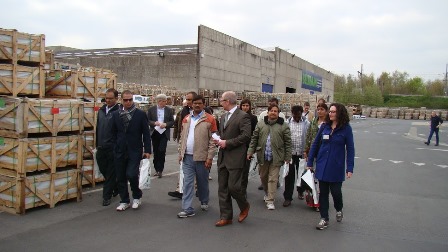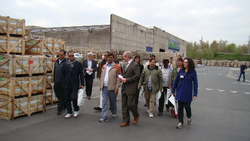Exploring solutions for an enhanced IUWM approach

Under the Adopting Integrated Urban Water Management in Indian Cities (AdoptIUWM) project, a one week exposure visit to Europe was conducted in the month of April. The aim of this tour was to expose the participants to the best practices in the field of Integrated Urban Water Management (IUWM) being undertaken in Europe and to provide options for Indian cities that are currently facing challenges in the Water sectors. Three European countries, Spain, Belgium and Germany were covered during this visit. Participants for the Exposure visit included 12 government officials representing Ministry of Urban Development (including Joint Secretary and Director), Principal Secretary State government of Rajasthan and City Representatives (Mayors, Commissioners, Engineers from Solapur, Ichalkaranji, Jaisalmer and Kishangarh). The selection of case studies was undertaken on the basis of prior identification of the issues being faced by the Project cities and States.
More than eight sites from seven cities (Zaragoza, Ieper, Koksijde, Harelbeke, Essen, Gladbeck, Dortmund) were visited and interactions with over eight European agencies were undertaken during this week long Exposure visit. Some of the cities visited during this tour like Zaragoza and Essen were involved in ‘Sustainable Water Management Improves Tomorrow’s Cities’ Health (SWITCH)’ program that was launched in 2006- 2011 in Europe, funded by the European Union.
The participants got an overview of the issues and challenges that were faced by the European cities while implementing an IUWM based approach and the measures taken to overcome these issues. This exposure visit also helped the participants, understand strategies and solutions for integrated planning and management of water and allied sectors and also helped them understand the institutional framework, technical knowhow, driving factors and governance aspects that have been adopted in Europe to facilitate IUWM.
In particular, case studies on Real time monitoring based on basin level planning in Zaragoza, dynamic water tariff system of Zaragoza, source to reuse planning for water in Koksijde and Intermunicipal cooperation in Belgium for SWM were identified by the stakeholders as most useful for replication in the Indian context.
"The case studies showed that reduced usage, sustainability and stakeholder consultations are the pillars for integrated development of a city", said Mr. Parmod Kumar, Director, Ministry of Urban Development.
The stakeholders opined that the concept of IUWM is extremely applicable and needed in the Indian context. An IUWM based approach also complements the existing Government of India initiatives like AMRUT, Smart cities and Swacch Bharat Abhiyaan.
The AdoptIUWM Project is a European Union Funded Project for capacity building and undertaking water sector reforms for 2 cities in Rajasthan and 2 cities in Maharashtra.
Know more about the AdoptIUWM project here.




